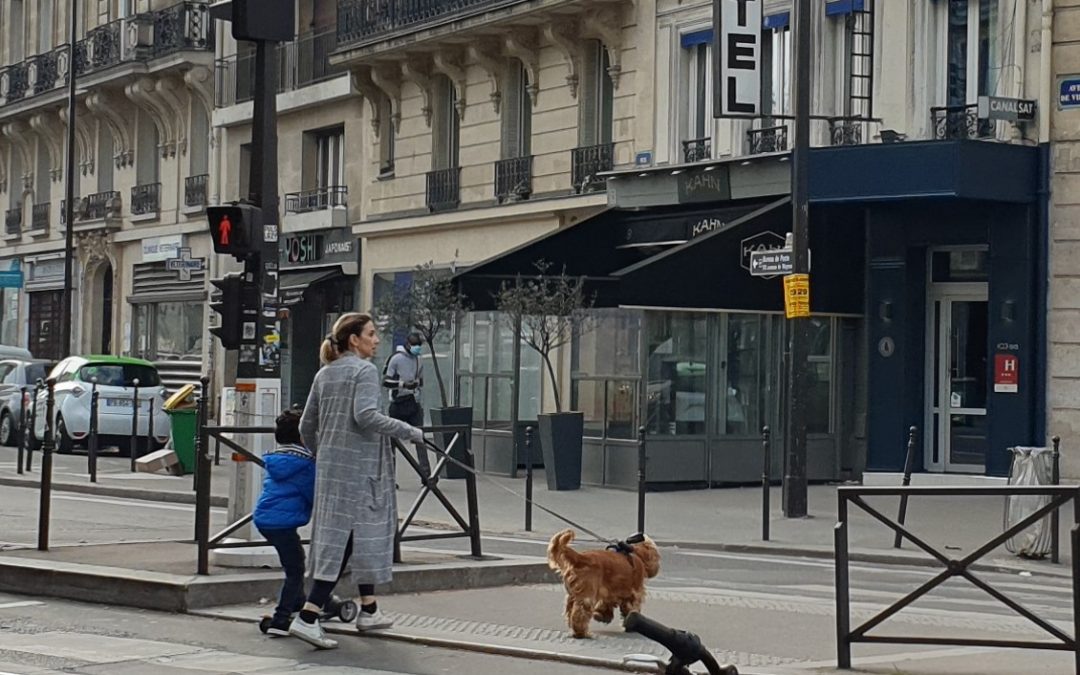By Anne Swardson
“We are at war,” President Emmanuel Macron said at least six times in the Monday night address at which he announced an effective lockdown of the entire country. He meant against the coronavirus.
But it’s becoming clear that the war is actually a covert conflict between the French (at least some of them) and France. The lockdown is turning into more of a walk in the park.

The cover of today’s Le Parisien newspaper featured a large photograph of crowds of people jogging along the Seine and shopping at open-air markets yesterday. “Is this what it means to be confined?” the headline asks. There has been much joking on Facebook about newfound joggers, picking up the sport just so they can get out. This as the number of new COVID-19 cases hit a record 1,861 yesterday. Deaths hit a record too, at 108.
In theory, exercising and shopping are legal. The five exemptions on the form that every French resident must carry — checked, signed and dated – when they leave home are for medical appointments, caring for a sick person or family member, grocery shopping, dog walking/exercise near home and, under certain conditions, work.
(This self-certification can lead to some redundancy. The other day, in full jogging kit, I went out for a run. With me, I carried a piece of paper, signed and dated by me, that I was running. I didn’t get checked. The only downside was that some of my favorite routes were closed.)

But they have clearly led to a more porous lockdown than the authorities probably envisioned, and officials are reacting. Yesterday, bicycling was banned because it took people too far from home, presumably raising the chances of coming in contact with others. “The time is for confinement, not for sporting performance,” the Sports Ministry tweeted.
Macron sounded cross during a visit to the Institut Pasteur yesterday. “When I see that people are continuing to go to the park, go to the beach or dive into the markets, it’s that they haven’t gotten the messages,” he told journalists.
But he and his government face several attitudinal problems in getting public cooperation. One is widespread skepticism of top-down authority, historically seen as being removed from the interests of the public. Macron fed this early in his presidency with several remarks that were perceived as arrogant. Another is a weakness for conspiracy theories. My physical therapist, practically the only person I am allowed to see these days other than my husband, thinks the government wants people to break the ban so that just the right number will get infected, flattening the curve.
The government itself has sent inconsistent messages. Sunday, people were told to go vote in municipal elections, but then rebuked for going to the park to enjoy the sunshine. Add to that a dose of Latin fatalism, the Mediterranean side of the French, and you get something less than total cooperation.
Still, I think it would be counterproductive for the government to crack down further. It will probably take more than the announced 15 days indoors for the number of new cases to slow substantially, and parents with small children are already frazzled.

And most people are in compliance. Today I counted 17 people walking or running around the Place du Maréchal Juin, where I live. Usually the sidewalks would be packed. In the Bois de Boulogne, where I took my first and, I guess, last bicycle ride yesterday, there weren’t many people and they were widely separated. No picnickers.

If we are going to go the distance, we need a little souplesse. As a 75-year-old woman told Le Parisien while strolling near the river: “I know I’m at risk. How can you not put your nose outside in this weather? Surely it can’t hurt to get a little air.”
Get new content delivered directly to your inbox.
